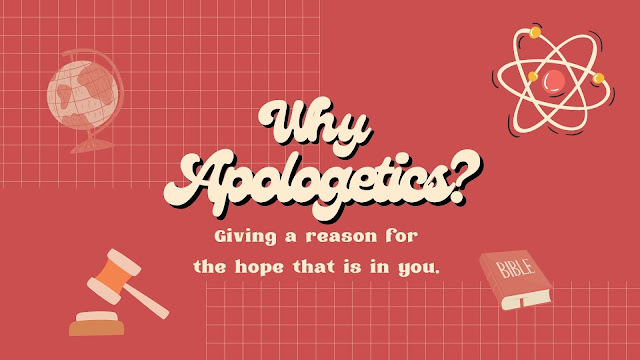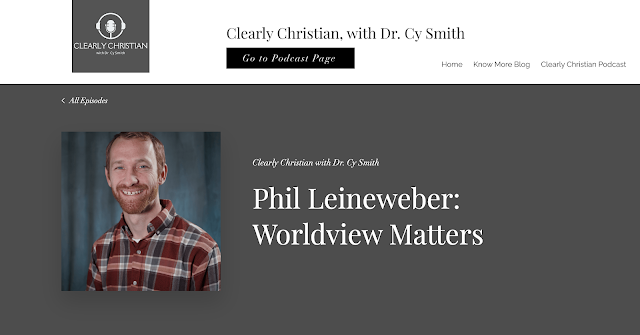The "Problem" of Evil and Suffering
One of the most common objections to the existence of God, or at least the Christian God, is the presence of evil and suffering all around us. How can a loving God allow this to happen? This question could be tied to a personal suffering or loss, a societal injustice, or a historical tragedy but all have the same idea in mind: "If God exists why is the world this way?"
This post is an adaption of a sermon I preached in 2019 (you can listen to this below). To start the sermon I walked through some of the significant health challenges my dad had experienced and celebrated God's goodness in that he was in person for my sermon on that sunny day in the July. Now, almost four years later, my dad has since passed away...but I firmly believe that this in no way negates the truth of this sermon and actually proves the importance of it.
It would be easy over those years of suffering for me or my dad and mom to doubt the goodness of God. Why, God? He has decades left of potential years that could be used for you. He has been a pastor for 40 years! Why him? How could you do this? Why would you have taken him away from this earth at the age of 68?
Most of us have experienced similar and even more significant pain, suffering, and evil in our lives. Things that have left marks on us that will never go away. I can personally think of many in my church family who have undergone significant health challenges and loss. Who have been the victims of great pain and injustice. These moments of pain and suffering are often used by the enemy and our culture to sow seeds of doubt in our faith in God. In this post we are going to look at what I believe is one of the greatest stumbling blocks to faith: the “problem” of evil and suffering
I wanted to start by saying that little, if any, of what I am about to say is original. I want to give credit to Tim Keller and his book The Reason for God as well as C.S. Lewis for his books Mere Christianity and The Problem of Pain.
What I hope to show, by the grace of God, is that evil and suffering are actually some of the strongest proofs FOR the existence of God and that Biblical Christianity among other religious systems gives us the best reason for and empowerment to endure suffering and evil in our lives.
Evil and suffering are actually some of the strongest proofs FOR the existence of God.
"If God is God and He can do anything he wants, He could stop this suffering! He could stop this evil. He SHOULD stop it. And since he doesn’t, he must (if he does exist) not be a loving God and he certainly cannot be good."
This is what I think we are hearing from many in our culture who reject God. "I don’t like my life, I don’t like myself, if God caused all of this then I want no part in Him. " We are echoing Job's wife who in the midst of her husband's suffering said, "curse God and die" (Job 2:9).
Now there are both intellectual and emotional reasons people reject God for because of evil and suffering. In the case of the latter, I would strongly encourage that there is "nothing you can say." When you encounter people in personal suffering the best thing to do is to just be with them and listen to them. There will be a time to point this individual to truth, but in the midst of pain what they need most is relational comfort. Your testimony of demonstrating this care very likely will be a platform to share truth with them at some point in the future.
Now, for the intellectual objection, I would recommend going on the offensive. The existence of evil and suffering are indeed a problem for the atheist.
The existence of evil and suffering are indeed a problem for the atheist.
Here are two reasons why:
1. Absolute Moral Truth Exists
The fact that very few are willing to argue that evil and suffering exists is amazing and it is a dilemma for the atheist.
This is no surprise! We see this in Scripture:
“Indeed, when Gentiles, who do not have the law (the law of Moses, the ten commandments and the further revelation of God’s moral will), do by nature things required by the law, they are a law for themselves, even though they do not have the law. They show that the requirements of the law are written on their hearts, their consciences also bearing witness, and their thoughts sometimes accusing them and at other times even defending them." (Romans 2:14-16)
We all know right and wrong. We all have a sense of oughtness. When someone cuts in front of us in the line at Cedar Point we immediately respond, “That’s Unfair!!” Say’s who?
This sense of fairness is seen in every culture (Egyptian, Babylonian, Chinese, Norse). There may be some variance here but every civilization has a sense of justice and morality that is greater than themselves.
There is such a thing as evil. Absolute moral truth exists. Though some in our culture seek to deny this I firmly believe if someone walked into their home or office and pointed a gun in their face they would be quick to promote moral absolutes, "This is wrong!" And they would be right!
Several years ago we had Aaron Brown an ambassador from Destiny Rescue, an organization that rescues children who are being trafficked in several different countries in Asia, share about the organization with our student ministry. He shared a story of going into a “night club” with his team in Bangkok, Thailand and they had 10-16 year-old girls brought out to be sold to them like a piece of meat (their teams make contact with these young children and seek to rescue them). Aaron shared that the average age of the girls they rescue is around 14 years. In 2016 they rescued a 4-year-old girl! The whole room was in moral outrage! We had students in tears and they were moved to action! I had a male student in 12th grade walk up on the spot and give me everything he had in his wallet (over $100). We had sixth grade girls selling bracelets in their school trying to help raise money for their sisters across the world in slavery. We raised over $5,000 and rescued three girls. Tell me this is not objectively a great evil.
Things like this are absolutely wrong! How does the atheist explain this? It cheapens the tragedy of rape, abuse, the Holocaust, injustice, to say it is all just a social construct. You could say that it is not ideal, "this kind of thing is not healthy for these children," that "it is not best for society," but this is not enough! Our heart tells us it is WRONG. It is EVIL! Our consciences bear witness to a moral law. Nothing can justify this kind of evil.
Moral issues are very important in our culture today! Think of #MeToo, Black Lives Matter,” immigration, environmentalism, world hunger and others. Our contemporary culture virtue signals all the time! As Christians we can use this moral obsession to ask: "Why does it matter?" “Why do you feel such a strong sense of moral obligation?” If we are all advanced primordial soup then why does equality matter so much? It is a dog-eat-dog kind of world (survival of the fittest right?), just do whatever you need to do to get ahead. But, we all know something greater is at stake and herein lies the problem for the atheist, absolute moral truth does exist and it leads to the second problem...
2. Absolute Moral Truth Points to a Lawgiver
Ask the atheist: "Who says it is wrong?" You say justice matters, who says? You promote equality, why is that so important?"
When anyone promotes an absolute moral law they are pointing to a lawgiver.
Can you have right and wrong without God? I don’t think so. Tim Keller hits the nail on the head here:
“If there is no God, then there is no way to say any one action is “moral” and another immoral.” “You may say the majority has the right to make the law (define what is right) but do you mean the majority has the right to vote to exterminate the minority? No. Back to square one." -Tim Keller
Again, Paul addresses this in his epistle to the church in Rome.
For what can be known about God is plain to them, because God has shown it to them. For his invisible attributes, namely, his eternal power and divine nature, have been clearly perceived, ever since the creation of the world, in the things that have been made. So they are without excuse. (Romans 1:18-20)
The moral law, the very character of God, written on our hearts and in creation point to a Supreme Lawgiver, the God of heaven and earth. This text says that we are then without excuse! The Moral Law points us to God. You can't have both a moral law and atheism.
C.S. Lewis shows this in his book, Mere Christianity. He says,
“My argument against God was that the universe seemed so cruel and unjust. But how had I got this idea of “just” and “unjust”?… What was I comparing this universe with when I called it unjust?… Of course I could have given up my idea of justice by saying it was nothing but a private idea of my own. But if I did that, then my argument against God collapsed too—for the argument depended on saying that the world was really unjust, not simply that it did not happen to please my private fancies…. Consequently atheism turns out to be too simple." (C.S. Lewis in Mere Christianity)
You see if naturalistic evolution is true, if we really are just byproducts of random time, chance, and evolution, then everything we see should be natural and normal: the strong eat the weak, this is Darwinism at work, that is the way of nature. But our hearts tell a different story! In the face of Nazism, genocide, and abuse we know EVIL exists and our souls cry out that suffering is not as it should be. This absolute morality points to God. The Law points to a Lawgiver. The discontent with the state of our world points to something beyond it.
This is why the existence of evil and suffering in the world are actually a problem for the atheist.
In the next post (read it here), we will explore why Biblical Christianity, compared to all the religious systems of the world, best gives us both a framework to understand the existence of evil and suffering and the strength and hope to endure it.
With Grace,
Phil
____________________
Read more articles by Phil on Apologetics HERE.
.png)




.png)


Comments
Post a Comment